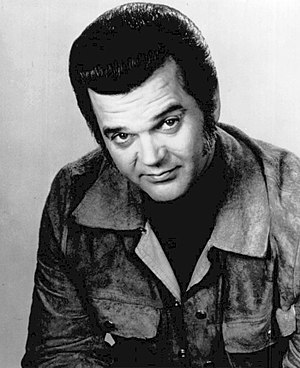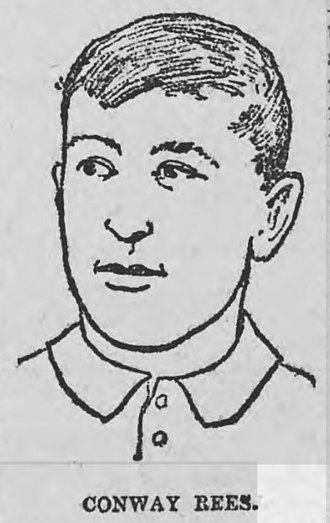Discover Your Roots
SIGN UPDiscover Your Roots
SIGN UPConway is a male name of Irish origin with the meaning "Head Smasher Or Yellow Hound." It is a Welsh, Irish, and Scottish given name, although its exact origin remains uncertain. The name may have derived from Welsh "Conwy," meaning "chief water," or from Irish "Conbhuidhe" or "O Connmhachain." Additionally, it could have originated from Scottish Gaelic "Mac Conmheadha" or "Mac Connmhaigh." Notable individuals bearing the name Conway include American NFL player Conway Baker, British mathematician Conway Berners-Lee, and Australian rock musician Conway Savage, among others. With its rich history and diverse cultural associations, Conway is a name that embodies strength and resilience.

Conway Twitty, born Harold Lloyd Jenkins on September 1, 1933, in Friars Point, Mississippi, was a prominent American singer and songwriter. Transitioning from the 1950s rockabilly scene, Twitty found his niche in country music, earning accolades and recognition throughout his career. His notable duets with Loretta Lynn garnered him several Country Music Association awards. Renowned for his sentimental and romantic song themes, Twitty's impact on country music was significant, leading to his induction into the Country Music and Rockabilly Halls of Fame. His chart-topping hits, including "Hello Darlin'", "You've Never Been This Far Before", and "Linda on My Mind", solidified his stardom. Twitty's influence extended beyond country music, as he also topped the Billboard Hot 100 chart with "It's Only Make Believe". Notably, he penned eleven of his Billboard Hot Country Songs chart-topping hits. Throughout his life, Twitty remained dedicated to his music career, leaving an indelible mark on the music industry.

Conway Holmes Hayman (January 9, 1949 – March 7, 2020) was an accomplished American football player and coach. He gained recognition for his outstanding performance as a guard during his college and professional playing career, and later transitioned into a successful collegiate head football coach. Hayman's notable achievements include being a consensus first-team All-American and All-East selection at offensive guard during his time at the University of Delaware, where he played from 1968 to 1970. His exceptional skills and leadership contributed to the team's three consecutive Lambert Cup titles, three straight Boardwalk Bowl wins, and two consecutive Middle Atlantic Conference championships. After his playing career, Hayman ventured into coaching, serving as the head football coach at Prairie View A&M University and as an assistant at Texas Southern University and Florida A&M University. In recognition of his significant contributions to the sport, Hayman was inducted into the Delaware Sports Hall of Fame in 1986. His impactful legacy continues to inspire and influence the football community.

John Conway Rees (1870-1932) was a renowned Welsh international rugby union player, known for his innovative introduction of the four three-quarter system. Born in Llandovery, Wales, Rees excelled both academically and athletically, graduating from Jesus College, Oxford, and becoming the first Welshman to captain Oxford University RFC. Throughout his career, he showcased his talent by representing various prestigious teams, including Cardiff, Barbarians, London Welsh, Richmond, Blackheath, and Llanelli.Rees made a significant impact on the Welsh national side, contributing to their success in the Home Nations Championship. Notably, he played a pivotal role in Wales achieving their first Triple Crown victory in 1893. Following his illustrious rugby career, Rees dedicated himself to teaching, imparting knowledge and values at Sherborne School, Rossall School, and Giggleswick School. His commitment to education extended to India, where he spent the last three decades of his life as a respected educator.On 30 August 1932, the world lost a remarkable sportsman and mentor, as John Conway Rees passed away, leaving behind a legacy of sporting prowess and educational contribution that continues to inspire.

Conway Barbour (c. 1818–1876) lived a remarkable life, transitioning from slavery to becoming a successful businessman and lawyer. His journey saw him serving as a state legislator in Arkansas and being elected to the Arkansas House of Representatives in 1871. Notably, he was the subject of Professor Victoria L. Harrison's book "Fight Like a Tiger: Conway Barbour and the Challenges of the Black Middle Class in Nineteenth-Century America," published by Southern Illinois University Press in 2018. Barbour, a Republican, represented Lafayette County, Arkansas in the state's House of Representatives before his passing in Lake Village, Arkansas. His story serves as an inspiration and a testament to the resilience and determination of individuals in the face of adversity.

Conway Oscar Baker (September 9, 1911 – May 28, 1997) was an American football player known for his professional career as a guard and tackle in the National Football League (NFL). He played for the Chicago Cardinals from 1936 to 1945 and was also a member of the combined Cardinals and Pittsburgh Steelers squad known as Card-Pitt in 1944. Born in Shreveport, Louisiana, Baker attended C. E. Byrd High School and later played college football at Centenary College of Louisiana. Following his football career, he worked for the City of Shreveport Traffic Engineering Department. Conway Oscar Baker passed away on May 28, 1997, in Shreveport after battling Alzheimer's disease. His legacy in the NFL continues to be remembered and celebrated.
All images displayed on this page are sourced from Wikipedia or Wikimedia Commons.We use these images under their respective Creative Commons or public domain licenses. Wherever applicable, author attributions and license information are provided. If you believe an image is used incorrectly or outside its license terms, please contact us so that we can review and correct the issue.